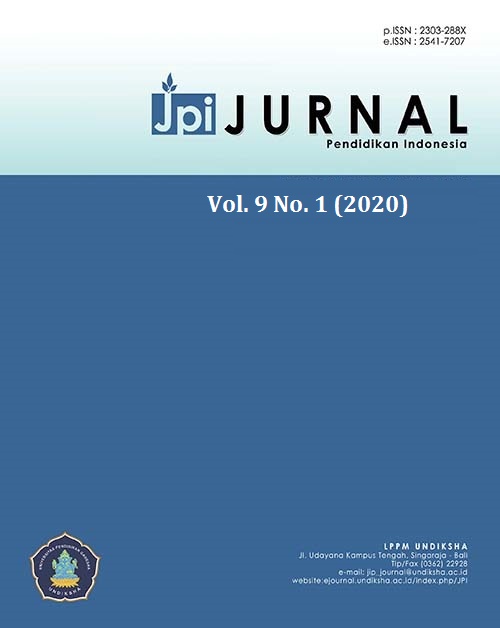Classification of Student Reasoning Skills in Solving Mathematics Problems in Elementary School
DOI:
https://doi.org/10.23887/jpi-undiksha.v9i1.23103Keywords:
Classification, Reasoning, Mathematical Problem-SolvingAbstract
The purpose of this study was to describe the classification of students' reasoning abilities in solving mathematical problems in elementary schools. The focus of this study is the classification of students' reasoning abilities in solving mathematical problems in the elementary schools of the city of Semarang. This study uses a qualitative approach. The Research subject is elementary school students at Tambakrejo Elementary School Semarang. Data is taken using tests. Based on data analysis, the reasoning classification is as follows: 36.25% understand the meaning in low categories, 37.5% think logically in low categories, 31.1% understand negative examples in low categories, 17.05% think deductions in very low category, 18.15% think systematically in very low categories, 31.65% think consistently in low category, 34.85% make excuses and determine strategies in low category, 49.85% determine method in low category, and 24.3% draw conclusions in low category. Thus the reasoning ability of students is low, students have not been able to think logically to make connections between empirical facts and the problems faced so they are not able to draw conclusions, students have not been able to do the thinking process to make arguments so that new statements are based on facts, it is necessary to develop learning models to improve mathematical reasoning of elementary school studentsReferences
Baig, S & Halai, A. (2006). Learning Mathematical Rules With Reasoning. Eurasia Journal of Mathematics, Science and Technology Education. 2, (2), 15-33.
Badan Pengembangan dan Pembinaan Bahasa, Kemendikbud. (2016).KBBI Daring. Diakses 25 Juli 2019. https://kbbi.kemdikbud.go.id/Cari/Index.
Fisher, A. (2009). Berpikir Kritis Sebuah Pengantar. Jakarta: Erlangga.
Hidayatullah, M., S., Sulianto, J., Azizah, M. (2019). Analisis Kemampuan Penalaran ditinjau dari Kemampuan Pemecahan Masalah Matematis. Thinking Skills and Creativity Journal. 2(2), 93-102.
Izzah, K., H., Azizah, M. (2019). Analisis Kemampuan Penalaran Siswa dalam Pemecahan Masalah Matematika Siswa Kelas IV. Indonesian Journal Of Educational Research and Review, 2(2). 210-218.
Kemendikbud. (2014). Peraturan menteri pendidikan dan kebudayaan nomor 103 tentang Pembelajaran Pada Pendidikan Dasar dan Menengah. Jakarta: Kementerian Pendidikan dan Kebudayaan.
Kemendikbud. (2015). Materi Pelatihan Guru Implementasi Kurikulum 2013 SD Kelas VI. Jakarta: Badan Pengembangan Sumber Daya Manusia Pendidikan dan Kebudayaan.
Kemendikbud. (2016). Peraturan menteri pendidikan dan kebudayaan nomor 22 tentang Standar Proses Pendidikan Dasar dan Menengah. Jakarta: Kementerian Pendidikan dan Kebudayaan.
Kusumawardani, D., R., Wardono, & Kartono. (2018). Pentingnya Penalaran Matematika dalam Meningkatkan Kemampuan Literasi Matematika. PRISMA, Prosiding Seminar Nasional Matematika. Unnes.
Moleong, J Lexy. (2017). Metodologi Penelitian Kualitatif. Bandung : PT Remaja Rosdakarya.
Nashihah, D., Sulianto, J., & Untari, M., A., U. (2019). Klasifikasi Kemampuan Penalaran Matematis Siswa Kelas IV Sd Negeri Tambakrejo 02 Semarang. Indonesian Journal Of Educational Research and Review. 2(2). 203-209.
Putri, D., K., Sulianto, J. & Azizah, M. (2019). Kemampuan Penalaran Matematis ditinjau dari Kemampuan Pemecahan Masalah. International Journal of Elementary Education. 3(3), 351-357.
Sajadi, M., Amiripour, P. &Malkhalifeh, M. R. (2013). The Examining Mathematical Word Problems Solving Ability under Efficient Representation Aspect. Journals mathematics Education Trends And Research, Vol. 2013. ISPACS International Scientific Publications And Consulting Services.
Schunk, D. H. (2012). Learning Theories an Educational Perspective. Yogyakarta: Pustaka Pelajar
Shadiq, F. (2004). Penalaran, Pemecahan Masalah dan Komunikasi dalam pembelajaran matematika. Yogyakarta: Departemen Pendidikan Nasional Pusat Pengembangan Penataran guru (PPPG) Matematika.
Shinha, D. (2018). Progressions In Reasoning In K-12 Mathematics. https://arxiv.org/pdf/1812.11947.pdf
Suharnan. (2005). Psikologi Kognitif. Surabaya: Srikandi.
Van De Walle, J. A. (2008). Pengembangan Pengajaran Matematika Sekolah Dasar dan Menengah Jilid 2. Jakarta: Erlangga.
Downloads
Published
Issue
Section
License
Authors who publish with the Jurnal Pendidikan Indnesia agree to the following terms:
- Authors retain copyright and grant the journal the right of first publication with the work simultaneously licensed under a Creative Commons Attribution License (CC BY-SA 4.0) that allows others to share the work with an acknowledgment of the work's authorship and initial publication in this journal.
- Authors are able to enter into separate, additional contractual arrangements for the non-exclusive distribution of the journal's published version of the work (e.g., post it to an institutional repository or publish it in a book), with an acknowledgment of its initial publication in this journal.
- Authors are permitted and encouraged to post their work online (e.g., in institutional repositories or on their website) prior to and during the submission process, as it can lead to productive exchanges, as well as earlier and greater citation of published work. (See The Effect of Open Access)








